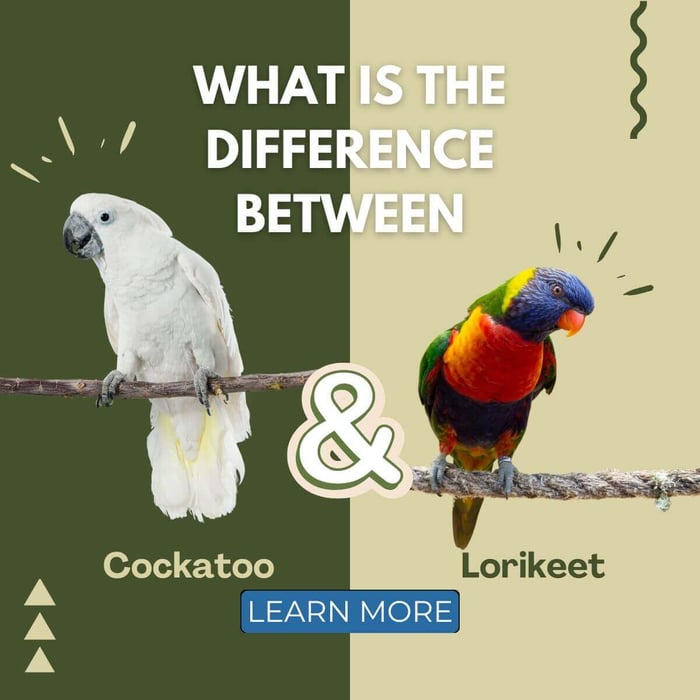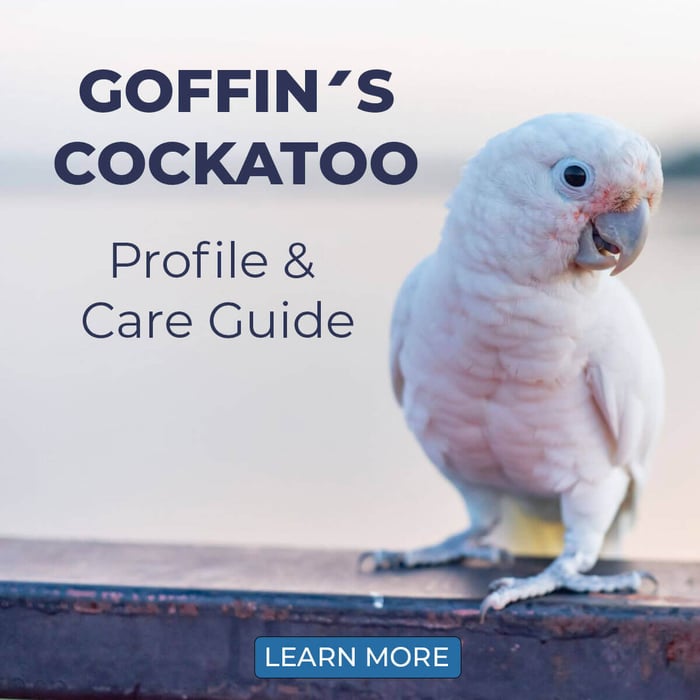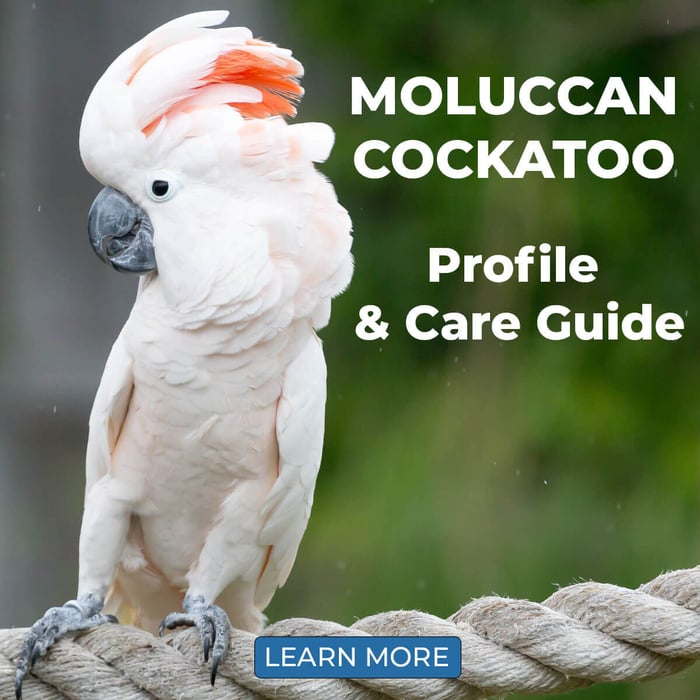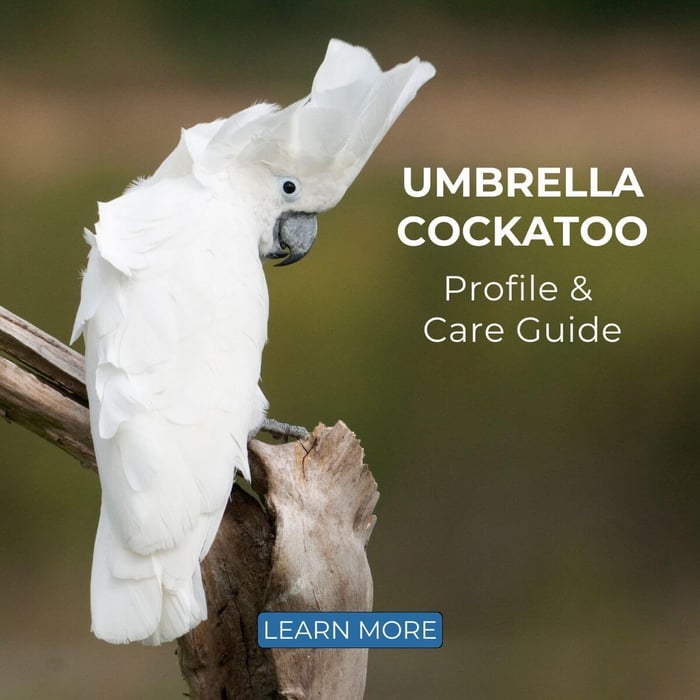Healthy Food for Cockatoos: Expert Feeding Tips
Feeding a cockatoo the right diet is essential for their long-term health, energy, and emotional well-being. These playful and highly intelligent parrots need more than just seeds, they thrive on a rich, varied diet that mirrors their natural foraging behaviour. Providing the right food for cockatoos is key to preventing illness, supporting mental stimulation, and ensuring your bird lives a long, happy life.
In this expert guide, we'll explore the healthiest food for cockatoos, along with tips on how to create the perfect meal plan, avoid common mistakes, and keep your bird happily nourished every day.
Why a Balanced Diet Is Vital for Cockatoos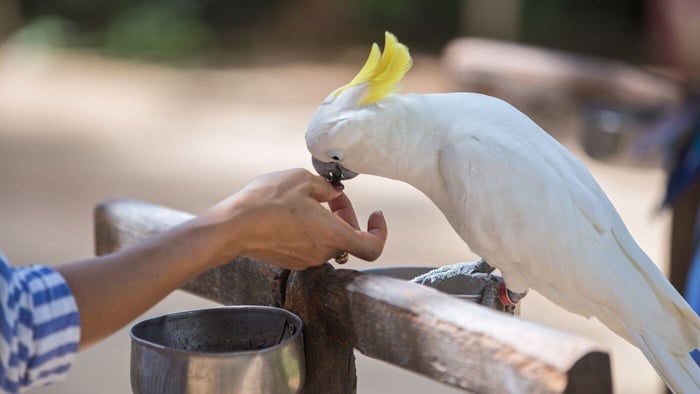
Cockatoos are known for their charm, affection, and high energy. However, their dietary needs are often misunderstood. Feeding only seeds, especially fatty sunflower or peanut-heavy mixes, can lead to:
- Obesity and fatty liver disease
- Vitamin and calcium deficiencies
- Behavioural issues like feather plucking
- Reduced lifespan
That's why it's crucial to build their diet around variety, quality, and balance. A proper diet not only prevents illness but also contributes to brighter feathers, a more stable mood, and a more active, alert bird. Choosing balanced, nutritious food for cockatoos also reduces the risk of common health problems caused by poor diets.
Cockatoos also benefit from variety in texture and presentation. Just like us, they enjoy different colours, shapes, and flavours. Creating an enriching feeding routine can reduce boredom and destructive behaviour, particularly in birds left alone for parts of the day.
The Core of a Healthy Cockatoo Diet: Pellets
High-quality pellets should form 60–70% of your cockatoo's daily food intake. Pellets are nutritionally complete and scientifically formulated to meet a parrot's daily requirements. Unlike seed mixes, they prevent selective feeding and ensure every bite delivers essential nutrients. Pellets are widely recommended as the best base food for cockatoos by avian vets and nutritionists.
Top Pellet Options:
- Askio Nature Complete Parrot Food Pellets - Made with all-natural ingredients and a wholesome blend of fruit and vegetables, Askio Nature is a great choice for health-conscious owners wanting to keep things clean and simple.
- Hagen Hari Tropican Lifetime Granules - Ideal for cockatoos of all ages, these granules are nutrient-rich and free from artificial colours. The balanced levels of protein and calcium support bone health and feather production.
- Harrison's High Potency Coarse - Harrison's High Potency Coarse Complete Organic Parrot Food is specifically designed to provide a nutritionally complete, 100% organic diet for African Greys, large Macaws, and other medium to large parrots.
Feeding Tip: When transitioning from seeds to pellets, introduce pellets slowly over 2–3 weeks. Start by mixing small amounts into your cockatoo's usual diet, gradually increasing the ratio. For stubborn eaters, try softening the pellets slightly or mixing them with mashed sweet potato.
Fresh Vegetables and Fruit: Nature's Nutritional Boost
Fresh produce should make up around 20–30% of your cockatoo's diet. Vegetables are particularly important, offering fibre, antioxidants, and important vitamins like A, C, and K. Including fresh fruit and veg is essential for offering natural food for cockatoos that reflects what they might forage in the wild.
Cockatoo-Safe Vegetables:
- Leafy greens like kale, Swiss chard, rocket, and spinach
- Orange veg like carrots, butternut squash, and sweet potato (great for vitamin A)
- Cruciferous veg like broccoli, cauliflower, and Brussels sprouts
- Others: courgette, peas, green beans, beetroot
Chop or shred vegetables into interesting shapes and mix them to encourage interest. Raw or lightly steamed veg is best, avoid using oil, salt, or seasoning.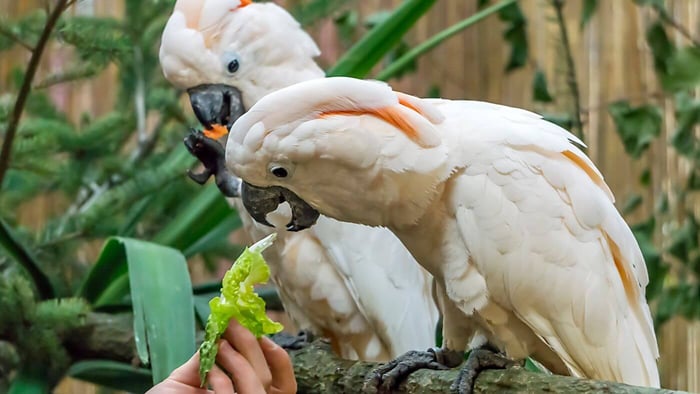
Fruits for Occasional Treats:
Fruits are higher in natural sugars and should be fed in moderation.
- Apple (no seeds), banana, kiwi, melon
- Papaya, mango, berries (blueberries, raspberries)
- Pomegranate (rich in antioxidants)
Enrichment Tip: Try hanging whole leafy greens with clips in the cage or placing fruit slices on a skewer for a more engaging mealtime.
Foods to Avoid:
- Avocado (toxic)
- Chocolate, caffeine, alcohol
- Onions and garlic
- Rhubarb
- Fruit seeds and pits (apple seeds contain cyanide)
These foods are never safe and should never be included in any type of food for cockatoos.
Seeds and Nuts: Tasty Treats in Moderation
Cockatoos naturally enjoy seeds and nuts, but they should only make up about 5–10% of their overall diet. Too much fat from seeds can lead to liver disease, while an imbalanced seed-only diet lacks vital nutrients. While not ideal as the main source of food for cockatoos, they can be beneficial when used correctly.
Best Nuts:
- Almonds, pistachios, walnuts, pecans (unsalted and unroasted)
Offer in small amounts and always shelled unless used as foraging enrichment
Best Seeds:
- Pumpkin seeds, flaxseeds, chia, hemp seeds
Avoid fatty seed mixes or those with artificial colours or preservatives
Use seeds and nuts as training treats, or hide them in foraging toys and puzzle feeders to stimulate natural foraging behaviour. It's a great way to encourage exercise and mental stimulation while offering a natural form of food for cockatoos.
Transitional Mixes and Healthy Treats
If your cockatoo is new to healthy eating or reluctant to try pellets, transition blends can help bridge the gap. These mixes combine seeds, pellets, and dried fruits/veg to ease birds into healthier habits.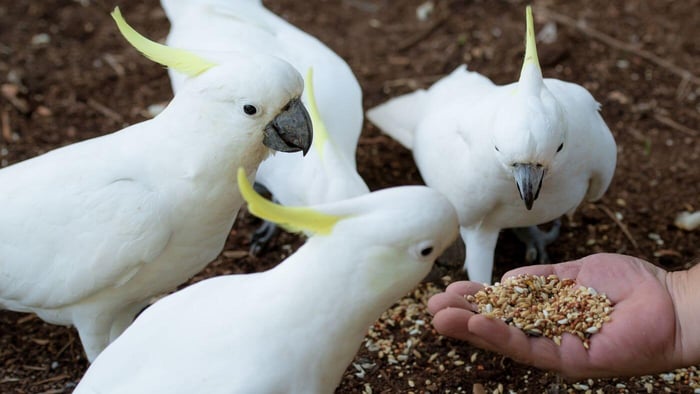
Recommended:
Sensible Seeds Mix with Fruit & Veg Pellets - Blends like this encourage birds to sample pellets while still enjoying familiar seeds.
Other healthy additions include:
- Cooked grains like brown rice, quinoa, barley (plain, no salt)
- Air-dried fruit and vegetable treats
- Organic popcorn (plain and unsalted) as a treat
Tip: Use a "chop mix" by combining fresh veg, cooked grains, and a few pellets to create a nutritious mash that can be offered daily and refrigerated for up to 3 days. These mixes are an ideal way to incorporate variety into daily food for cockatoos.
Supplements: When Are They Needed?
Supplements can be helpful in certain situations, particularly for birds not eating a full pellet-based diet or those with higher nutritional demands.
Useful Supplements:
- Daily Essentials 3 – A multivitamin for parrots on seed diets or varied feeding routines.
- Calcivet (Calcium + D3) – Important for bone strength, breeding birds, or those with limited UVB exposure.
- Moulting support – Special tonics support healthy feather regrowth during seasonal moults.
Always consult an avian vet before using supplements regularly. Over-supplementation can be harmful.
Supplements can't replace proper food for cockatoos, but can help fill in the gaps when necessary.
Feeding Tips from the Experts
Feeding your cockatoo isn't just about what you give, how you give it matters too. Presentation and routine are as important as nutritional content when it comes to food for cockatoos.
- Offer Variety - Change up ingredients and presentation regularly. Offer chopped, shredded, mashed, and whole items to keep interest high.
- Use Foraging Toys - Hide food in cardboard rolls, boxes, or foraging feeders to mimic wild behaviour and keep your bird mentally stimulated.
- Monitor Weight and Condition - Weigh your cockatoo weekly and observe body condition. A healthy bird should have a prominent but not sharp keel bone and feel firm and muscular.
- Maintain Hygiene - Remove uneaten fresh food after 2–3 hours and clean food bowls daily. Always provide fresh water and avoid placing dishes under perches.
Final Thoughts
Choosing the right food for cockatoos is one of the most important things you can do to ensure your bird's long, happy life. A healthy, balanced diet grounded in high-quality pellets, fresh vegetables, moderate treats, and expert guidance will lead to better health, brighter feathers, and a more content companion.
If you're unsure where to start or want help transitioning your bird to a new diet, feel free to reach out to our team or join the Parrot Essentials Facebook Group for community support.
Your cockatoo deserves the very best, and with the right food and care, they'll reward you with affection, playfulness, and years of joyful companionship.
FAQs
What is the best daily food for cockatoos?
A high-quality pellet should make up 60–70% of your cockatoo's diet, supported by fresh vegetables, occasional fruit, and small amounts of seeds or nuts.
Can cockatoos eat a seed-only diet?
No. A seed-only diet can cause obesity, liver disease, and nutritional deficiencies. Seeds should be offered only as treats or training rewards.
How do I switch my cockatoo from seeds to pellets?
Transition slowly over 2–3 weeks by mixing pellets into their usual food. Gradually increase the pellet ratio. Try softening pellets or mixing them with mash if your bird is reluctant.
Which fruits and vegetables are safe for cockatoos?
Safe vegetables include kale, carrots, broccoli, and sweet potatoes. Safe fruits include apples (no seeds), bananas, and berries. Avoid avocado, rhubarb, and fruit seeds.
How often should I feed fresh food?
Fresh vegetables and fruits should be offered daily, making up about 20–30% of the overall diet. Remove any uneaten fresh food after a few hours.

